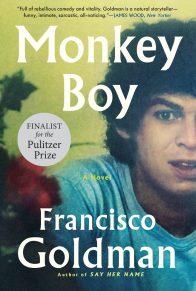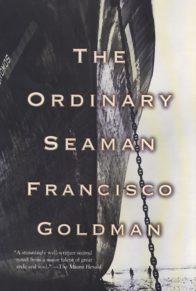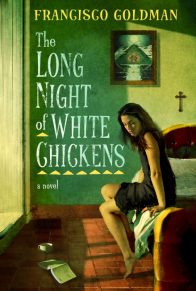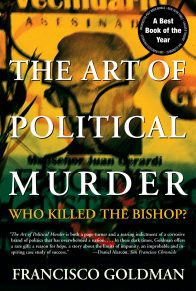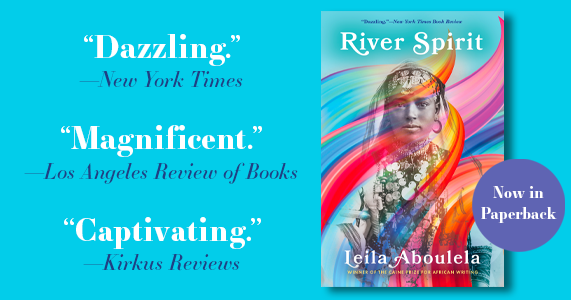“Passionate and moving . . . Beautifully written . . . The truth that emerges in this book has less to do with the mystery of [Aura’s] death . . . than with the miracle of the astonishing, spirited, deeply original young woman Goldman so adored. . . . So remarkable is this resurrection that at times I felt the book itself had a pulse.” —Robin Romm, The New York Times Book Review (front cover)
“To call Francisco Goldman’s book about the death of his young Mexican wife an elegy hardly represents it. Lament is closer, but insufficient. It is a chain of eruptions, a meteor shower; not just telling but bombarding us in a loss that glitters. With the power and fine temper of its writing, it is as much poem as prose. . . . Tense set pieces, respectively heartbreaking and chilling . . . generate the book’s propulsive drama. What they propel, though, is its most remarkable achievement: the incandescent portrait of a marriage of opposites.” —Richard Eder, The Boston Globe
“Say Her Name brings something new to the rime of the grieving survivor: fresh supplies of imagination, ruthlessness and over-the-edge crazy love. . . . The intensity, tenderness and heat of this love is extraordinary; how many of us have ever been loved so well? Or would recognize such love, were it not laid out with such intelligence and precision?” —Marion Winik, Newsday
“[Say Her Name] is exhilarating, a testament to love that questions our suppositions about luck, fate, good fortune, and tragedy, and demands our agency in interpreting the narrative arc of an altered life. . . . Goldman’s novel stands as an incisive, diamond-sharp act of love.” —Jayne Anne Phillips, Vanity Fair
“Quietly devastating . . . Powerful . . . As the story builds—inevitably, unbearably—toward Aura’s last day, Goldman has so convincingly brought her to life that her death still somehow comes as a shock. . . . Goldman’s beautifully written, deeply felt ode to his wife . . . lets you meet this unusual woman through Goldman’s lovestruck gaze, and you can’t help falling for her a little too. Even after the book ends, the sting of Aura’s absence lingers.” —Rob Brunner, Entertainment Weekly (A-)
“Say Her Name is the real thing—350 mesmerizing pages that don’t fit the usual script. . . . Honest and exquisitely written, a . . . love story with real emotional power.” —Ellen Emry Heltzel, The Seattle Times
“One of the best novels I’ve read in years. Finish this book and you will be reminded what love is and what it costs and how it saves us.” —Junot Díaz (interview with The Rumpus)
“Not only beautifully written, but an incredible portrait of a marriage and the tragedy that eventually pulls it apart.” —Devyani Saltzman, The Globe and Mail (Favorite Book of the Year)
“Wrenching but also warm and often funny . . . The beautiful and skilled fluidity of Goldman’s writing . . . never falters. [He] spins all his threads continuously, almost breathlessly, as if weaving a spell that keeps Aura present, as though he’s afraid to pause for breath lest the spell be broken. It is the spell of storytelling itself; the magic of incantation that creates and keeps alive the beloved.” —Laura Cogan, Zyzzyva
“Extraordinary . . . The more deeply you have loved in your life, the more this book will wrench you . . . In a voice that is alternately lush and naked, lyrical and sardonic, philosophical and wry . . . Say Her Name will transport you into the most primal joy in the human repertoire—the joy of loving . . . [It] pushes back against the tides of forgetting, and gives Aura a new body, a literary body, to inhabit—a body so vivid that by the end of the book we feel as though we ourselves have met and loved this woman.” —Carolina de Robertis, San Francisco Chronicle
“Beautiful, raw, haunting . . . [Say Her Name is] a working diagram of love, all its wiring and bolts . . . Losing a spouse is like contracting an incurable illness. Many medicines will be essayed [but] the only real cure is the return of the lost. Writing a book must present itself as the next best remedy, given . . . how many writers have had recourse to its purgative powers: Joan Didion, Joyce Carol Oates, Calvin Trillin. . . . all wrote memorable books about losing their mates. These are essential volumes in the library of grief and remembrance; with Say Her Name, the inimitable powers of poetic fiction are added to the memorial shelf . . . Writing like this, immediate, hopeful, vibrant, can only be considered an act of creative restoration. It is also a prayer to prevent another loss: forgetting.” —Melissa H. Pierson, The Barnes & Noble Review
“A deftly playful literary work . . . Aura is so vibrant on these pages that we are shocked afresh with each reminder of her death; and thus we feel an infinitesimal fraction of what Goldman must feel. . . . Reminds us that love is flawed, that the coming together of two people is a complicated affair, and that love is delicate partially because of all these lines of fracture in a union that the couple must struggle to contain. . . . We are never in doubt . . . of the author’s love . . . It never wavers and—given life by Goldman’s consummate artistry—it drives the book.” —Veronica Gonzalez, Los Angeles Review of Books
“A heartbreaking novel of loss and grief.” —Karen Holt, O Magazine
“Goldman has called on his formidable resources to tell the story of Aura’s life, their life together and his grief as a widower . . . Harrowing and often splendid reading. . . . these pages manage to bring Aura Estrada back to life. She is unforgettable. Count me glad and grateful to know her name.” —Karen R. Long, The Plain Dealer
“Heartwrenching.” —People
“Riveting . . . In giving Aura’s imagination—as well as her impish humor, her anxieties, her academic and creative struggles, her writing, her love—room to play, Goldman, remarkably, vividly, brings her to life.” —Alden Mudge, Bookpage
“An earthy, sexy book . . . Say Her Name resonates with sense of place and grasp of character . . . [Goldman] describes Aura so vividly it is as though she regains life as a free spirit of remarkable imagination.” —Carlo Wolff, Pittsburgh Post-Gazette
“Goldman’s power of description lulls you into forgetting that you’re reading a tragedy . . . He blurs the line between lover and biographer. . . . [Say Her Name] is a map of grief and work and missed chances.” —Phoebe Connelly, NPR.org
“[Say Her Name] unfolds as a sequence of long flashbacks leading toward Aura’s death, which ticks grimly through the narrative like a bomb . . . Trapped in a Chinese puzzle box of anguish, [Francisco Goldman] revisits moments, words, thoughts, anecdotes and images. His life with Aura seems still to be happening inside him, playing itself over and over, inevitably interrupted but never ended.” —Roxana Robinson, The Washington Post
“Wrenching . . . The story moves inexorably toward [Aura’s] death, but along the way it beautifully preserves the mementos of her life . . . touched with essential and painful wisdom about love.” —Sam Sacks, Wall Street Journal
“In telling the story of an exuberant young woman coming into her own as a scholar and writer, [Francisco Goldman] finds a kind of haunted solace—and tremendous commemorative power . . . Published as fiction, Goldman’s tribute to his late wife rings devastatingly true.” —Megan O’Grady, Vogue
“This is a beautiful love story, and an extraordinary story of loss. Say Her Name has a forensic honesty, a way of treating each detail, each moment, each emotion, with detailed and exact care. It also has a way of holding the reader, of moving between Brooklyn and Mexico City, capturing the essence of two worlds, capturing the essence of two people who were lucky enough to fall in love.” —Colm Toibin, author of Brooklyn
“There is beautiful writing in this book—beautiful, perceptive descriptions of places, beautifully turned assaults on the citadel of loss, on the firmament of love and passion, indelible glimpses of the self as bedlam. And thank goodness it’s so, because it is such a sad story that only beauty could possibly redeem it.” —Richard Ford
“Unflinching and heartbreaking . . . A most-fitting analogue is Leonard Michaels’s Sylvia. . . . Goldman comes away from writing this novel with an understanding that though his wife’s death was random and meaningless, her life wasn’t.” —Armando Celayo, World Literature in Review
“We may feel we know something about love’s burn, the scorching heat of loss, but reading this book is to stand in front of a blow-torch, to take a farrier’s rasp to raw nerve ends. Say Her Name is wrenching, funny, powerful, and beautiful.” —Annie Proulx
“The madness of love, of death, of loss, of literature—Say Her Name is madness knit up into magnificence. We can only suspect that Francisco Goldman is an alchemist, or a magician, or a Faust, or a Job, or all of these things, for with no breathing equipment, he has mined a pearl from the ocean’s darkest depths. This book is fabulous in every sense of the word.” —Rivka Galchen, author of Atmospheric Disturbances
“A beautiful act of remembrance, love and understanding. An essential, unforgettable love story and a living testament to an extraordinary woman.” —Gary Shteyngart, author of Super Sad True Love Story
“Say Her Name is a tender and sacred narrative, many-angled, fearless, incandescent in its frankness. As I read it, I felt I were reading something more alive than life itself, and thought this is surely why one reads, why one writes: that one might mingle oneself with a beloved person, a book, a landscape, and hold it . . . utterly alive.” —Kiran Desai, bestselling author of The Inheritance of Loss
“Enrapturing . . . Vivid . . . Goldman has entwined fact and fiction in his previous novels, but never so daringly or so poignantly. . . . Tender, candid, sorrowful, and funny, this ravishing novel embodies the relentless power of the sea, as hearts are exposed like a beach at low tide only to be battered by a resurgent, obliterating force, like the wave that claims Aura’s life on the Oaxaca coast. Out of crushing loss and despair, Goldman has forged a radiant and transcendent masterpiece.” —Donna Seaman, Booklist (starred review)
“Moving and tragic . . . gorgeous, heartbreaking.” —Kirkus Reviews (starred review)
“Electric and poignant.” —Publisher’s Weekly (starred review)
“The feeling, the memorial incarnation that this book creates, is monumental. Essential . . . This book about tragic death is a gift for the living.” —Library Journal (starred review)
“Say Her Name must be the only book about love ever written. It’s certainly the only one I’ll ever need to read. Francisco Goldman has alchemized grief into joy, death into life, and the act of reading into one of resurrection. His book is a miracle.” —Susan Choi
“Francisco Goldman tells us that in ‘descending into memory like Orpheus’ he hopes he might ‘bring Aura out alive for a moment.’ But in the act of writing, Goldman transcends the constraints of myth, and achieves nothing short of the impossible. Page by page, by the breath of his own words, Say Her Name restores Aura from shade to flesh, and returns her, unforgettably and permanently, to our world.” —Jhumpa Lahiri
“Say Her Name is no mea culpa memoir masquerading as fiction to protect the innocent, but a kind of critical/collage approach to catharsis that is formidable, generous, and depleting . . . The reader might experience an ascending guilt enjoying the lush uncanniness of Goldman’s language of grief, which can be as tailored and whimsical as a Cesar Aira novel and as grounded as Saul Bellow’s Herzog or Humboldt’s Gift. Say Her Name reads very close to suspense literature, wherein the tension that it builds is not over the safety of its characters, but over that first moment when the reader will be compelled to weep, a fracture (wherever it happens for you) into absolute empathy that is delayed with the humor and pacing of a master storyteller who is now a slave to the facts of his real life, and who knows it his job to give these facts away.” —Roberto Ontiveros, Austin American Statesman
“Francisco Goldman’s intimate and elegiac tribute to his late wife initially reads like the latest entry in a long list of tragic love stories starting with Orpheus and Eurydice. That alone would suffice to make this a compelling read. But Goldman goes further .
. . [From] Aura’s diaries, laptop and handwritten notes . . . Pygmalion-like, Goldman reconstructs a fully rounded, wise, soulful, funny Aura . . . Say Her Name sustains Aura Estrada for the ages.” —Rhoda Trooboff, Washington Independent Book Review
“Say Her Name is part mystery, part biography, part meditation on grief, and, finally—mostly—a love story. Goldman’s writing has astonished me in the past, but Say Her Name is powerful and surprising and even funny in ways that feel unique. He has, in a sense, invented a form.” —Lila Byock, The Paris Review online
“Say Her Name transmutes tragedy into a kind of romantic epiphany . . . An amazing read.” —Corey Seymour, W Magazine
“This book lingers in the spell of love, drawing it out, savoring each note, each dissonance, its mystical strangeness . .
. Say Her Name shimmers with power.” —Laura Cogan, Zyzzyva
“A beguiling, many-layered portrait of a happy marriage . . . and a gut-wrenching account of being its sole survivor.” —Colette Bancroft, The St. Petersburg Times
International Praise for Say Her Name:
“A heartbreaking novel [yet] also a joyful celebration of love.” —Grazia
“An exceptional book . . .A love letter to a woman who could have been a great writer . . . A letter of goodbye from a man falling apart . . . An amazing tribute, beautifully written, reminiscent of the vulnerability of Joan Didion’s The Year of Magical Thinking.” —Viv Groskop, The Independent (UK)
“It is an immensely powerful and thoroughly accomplished piece of work . . . Their relationship is incandescently evoked. [Aura] is returned to life in the retelling.” —Arifa Akbar, The Independent (UK)
“Lightly fictionalised, part memoir, part biography, it [crosses] boundaries of form as readily as its lovers slip from English to Spanish . . . Beyond its startling vivisection of grief, the book’s redeeming beauty lies in its precise evocation of a transformative love, filled with tenderness and comic routines.” —Maya Jaggi, The Guardian (UK)
“Sensitive [and] elegiac . . . A luminously loving account . . . Say Her Name is a work of raw grief refined into lyrical elegance.” —Jane Shilling, Sunday Telegraph (UK)
“What makes Say Her Name so unforgettable, apart from the beauty of the writing, is that the book is written partly as a love story but also partly as a moral trial.” —Sarah Sands, London Evening Standard (UK)
“[Goldman’s] love of and infatuation with [Aura] imbues every page . . . Each perspective illuminates her from a fresh angle, presenting the reader with a portrait of a vibrant and brilliant scholar . . . [Say Her Name is] destined to receive international attention.” —Claire Kilroy, Irish Times
“Goldman[‘s] narrative bears the seamless finish of a classic . . . [a] truly unforgettable work.” —Stephanie Cross, dailymail.co.uk
“A story of boundless love and unspeakable loss, [Say Her Name] is also profoundly restorative: by recounting Aura’s life, [Goldman] has recreated a love affair that will never die.” —Edinburgh International Book Festival, edbookfest.co.uk
“Goldman’s style is vivid and intense . . . assured and powerful, and it’s this true story of his pain and the utterly fearless way he reveals himself—his lies and cowardice, his blind, noble, unfathomable grief—that makes this book compelling.” —Jose Borghino, The Australian
“After Francisco Goldman’s wife died in a freak accident, he sought to keep her alive by writing. . . . Thanks, in part, to Goldman’s powers of revivification, Aura [is] about as forgettable as Cleopatra. Both a beautiful evocation of love and loss, and a searing dispatch written from within a personal Ground Zero . . . [Say Her Name is] the must-read novel of the summer.” —Tom Shone, Sunday Times (UK)
“Say Her Name leads the reader into Goldman’s private underworld, and somehow, sure-footedly, manages to navigate a way out.” —Tim Adams, The Guardian/The Observer (UK)
“Say Her Name presents and then interrogates two mysteries. The first is the state and nature of love and the second the violation of that love by sudden accidental death . . . By the end the two mysteries become very simple . . . To search for the meaning . . . is pointless and exhausting . . . the memory of love is all that survives in this . . . moving book.” —Helen Dunmore, The Times (UK)
“For all its self-conscious literariness, Say Her Name owes its power to the raw, unsettling immediacy with which Goldman tells his experience of loss.” —Stephen Henighan, TLS (UK)
“A deeply personal lament . . . Goldman . . . mourns the loss of [Aura’s] future and tries to reconcile himself to the role of widower.” —Marie Claire (UK)
“Unbearably moving . . .” —Reader’s Digest (UK), Readersdigest.co.uk , August 2011
“Anguished yet beautiful . . . Goldman . . . puts the story together like an intricate mosaic . . . [Aura] had spark and life, and by the end . . . we readers miss her, too.” —Claire Longrigg, Psychologies Magazine
“[A] beautiful book of mourning, written with finesse, and even with verve . . . Goldman knows very well how to generate images that are evocative or poetic, often light and sometimes funny.” —Raphaëlle Rérolle, Le Monde (France)
Bookseller Praise for Say Her Name:
“By writing this novel, Goldman has transformed a singular, devastating life experience into art, using his practiced eye to catch every nuance and detail of the life of a couple deeply, almost deliriously in love, and the desperate, disbelieving state of grief that ensues when an accident changes everything in an instant. It is a particular story, but also a universal one, rendered beautifully, achingly, and not to be forgotten.” —Marion Abbott, Mrs. Dalloway’s Literary & Garden Arts, Berkeley, CA
“Written following the sudden death of his beloved wife, Francisco Goldman’s Say Her Name is a novel of grief, love, longing, and despair, one of the most powerful I’ve read in a long time. It’s beautiful and so spare and clean that at times I found myself looking away because the pain it evoked was so real. Readers will come to know Frank and Aura better than they know most people, better even than they may know themselves. Always compassionate in his portrayal of the human heart, Goldman is at his very best in this magnificent book.” —Michael Barnard, Rakestraw Books, Danville, CA
“Francisco Goldman, the author of three brilliant novels and a work of nonfiction, has melded those two genres into a stunning work that is true to both forms and to neither. We are first told a few brief facts: that his young wife, Aura, is dead; that her parents believe him to be responsible for her death; and that, two years later, he is still consumed by grief. Then, as he tugs the reader in and out of the vortex of that grief; back and forth between Brooklyn, where they lived, and Mexico City, where she grew to adulthood; in and out of the mystery of her death and the greater mystery of who she was, who they were together, an awful illumination occurs—that madness is the natural outcome of such loss. Memory functions as the detective in this remarkable book, uncovering, detail by detail, the sweet dailyness that coalesced into their passionate and loving life together, and her complicated relationship with her mother. By throwing those lives into bold relief, he reveals in raw, stripped-bare form what love and its loss mean—not the stuff of fact but of the very best fiction.” —Betsy Burton, The King’s English Bookshop, Salt Lake City, UT
“Say Her Name is a beautifully written mediation on life, love and loss. Francisco Goldman uses the art of fiction to magically transform the tragic death of his wife into an intense and powerful revelation of her identity—so that when you finish the book, you feel that she is with you, and you know her well.” —Ed Conklin, Chaucer’s Bookstore, Santa Barbara, CA
“In Say Her Name, Francisco Goldman mines the unbearable loss of his vibrant, brilliant young wife Aura through the painstaking excavation of their love and marriage, all the while questioning his complicity in her death. Yes, this is a rumination on grief, but, more fully and accurately, it is a tenderly drawn, devoted celebration of the ways in which passionate, adult, intellectual and artistic love emboldens and enriches life. This book is, simply put, stunning.” —Libby Cowles, Maria’s Bookshop, Durango, CO
“Francisco Goldman’s novel Say Her Name is a beautiful remembrance of his life with his wife and fellow writer Aura Estrada. She dies suddenly and way too young in a freak swimming accident. He paints an extraordinary portrait of their time together, her talents and his stunning grief at her loss—life before, life during and life after. This novel is one for the ages, rich and textural and presented with so much heart and soul that I can only say this story has embedded itself forever into this reader.” —Sheryl Cotleur, Book Passage, Corte Madera, CA
“Francisco Goldman has written a majestic paean to love and life, incongruously centered around the sudden, tragic death of his wife, Aura Estrada. Goldman soars to the height of ecstasy and plunges to the depth of despair as he lays bare the emotions of his marriage and reaction to death. Expressed with surprising humor and incredible insight, he displays the emotions of love and grief in a form that will leave an indelible impression on readers and leave this novel as a permanent monument to his extraordinary wife and talent.” —Bill Cusumano, Nicola’s Books, Ann Arbor, MI
“Francisco Goldman’s Say Her Name is an astonishingly beautiful kaleidoscope of love and loss, set in Brooklyn and Mexico City, before and after the sudden death of his wife. With unabashed clarity, Goldman strips bare his four year relationship with Aura, his picture-perfect bride, granting readers a voyeuristic inventory into their time together. When her life is unexpectedly cut short on an idyllic beach holiday, Goldman’s suffering becomes our own. When Aura’s family places the blame squarely on Francisco, the shock of her death slams headlong into indignation. And when Francisco himself wishes to die, we also die a bit inside. As a reader, I have never encountered a book with such insight into what it is to love, and to how we can survive when those we care for do not. As an aspiring writer, I am in awe at the lightness, humor and grace of his prose. As a bookseller, this book is a grand gift—I am confident that anyone who enjoys reading will also sense the rare magic in Say Her Name, and will be moved, the same as I was. As a husband, this book chills me to the bone. Say Her Name is a book that cries to be read, screams to be shared, and whispers to be remembered.” —Kevin Hunsanger, Green Apple Books, San Francisco, CA
“The words that come to mind to describe this book: lyrical, powerful, painful, beautiful, are like shadows on a cave wall and do not come close to describing the true light that surrounds the experience of reading it. Goldman’s story of loss and love filled my heart in the same way my spirit can soar when viewing a masterful work of art or hearing music of pure genius. I simply would love everyone in the world to read this book, if only to taste for a moment the exquisite pleasure of glimpsing the true beauty of love, told by a master storyteller.” —Lanora Hurley, Next Chapter Bookstore, Mequon WI
“When the love of his life dies in a tragic accident, the narrator of Francisco Goldman’s new novel Say Her Name sifts through the fragments left behind to tell a story of passion, fragility, and eternal connection. Surprisingly lively, Say Her Name is a brilliant exploration of how relationships develop and endure. This is an intricate, intimate look at two lives interrupted. By the end, you will know the beautiful woman this book is written for, and you will never forget her. Lucky you.” —Geoffrey Jennings, Rainy Day Books, Fairway, KS
“Francisco Goldman’s novel is wonderfully creative literary hybrid, a novel based directly on events from the author’s life. Goldman lost the love of his life in a freak accident on a Mexican beach just a couple of weeks shy of their two year anniversary. Recounting the life and love they shared and the time leading up to Aura’s tragic death, Goldman makes readers fall in love with this amazing, intelligent, creative, and beautiful young woman. While it is heartbreaking, it is also a life affirming testament to the power of love. Goldman’s style and passion for his subject make this a singularly unique literary experience.” —Mark LaFramboise, Politics & Prose Bookstore, Washington, DC
“This was not the obituary that I had initially feared. Part Diary, Part Novel, Part Reportage Say Her Name begins almost like stumbling into Francisco Goldman’s mind. The beautiful love letter that is this book winds its way through the stream of consciousness that lays bare all of Goldman’s emotions and thoughts, what he knew and discovered about Aura and how he goes about the process of being startled awake into a completely different life. It is as much a celebration of their life together, of all the small moments they shared, as it is a story of loss. It tells their story in a masterful way that will resonate with everyone that will read it.” —Michael Link, Joseph-Beth/David-Kid Bookstores
“Bringing the dead to life is no easy task but Francisco Goldman has done it in his beautiful novel memorializing his wife, Aura Estrada, who died in a surfing accident in 2007. A great love does indeed live beyond the grave—and Goldman brings us the joys and the comic relief as well as the tragedy that ended his marriage.” —Marian Nielsen, Orinda Books, Orinda, CA
“Say Her Name is honest and bracingly beautiful, honoring a remarkable young woman, reveling in love, and confronting unbearable loss. Francisco has created a gift for all who have known, or who wish to know, love, even in its most tragic moments.” —Melinda Powers, Capitola Book Café, Capitola, CA
“There are books writers choose to write, and there are those where they are chosen. The story Frank Goldman tells in his utterly heartfelt, bravely artful Say Her Name, is surely the last one he would have wanted to write. But it became the one he had to write, a book chronicling almost indescribable loss, and at the same time celebrating vivacity, exuberance, and ardent spirit, the young woman that Aura Estrada was, and through writing, is. In the ache and longing there is also a palpable, transcendent gratitude. This book is a gift to everyone who reads it mindfully, instructive in showing how much we are marked by others in our lives—in life, death, presence, absence—what can be carried in the heart, no matter what.” —Rick Simonson, Elliott Bay Book Company, Seattle, WA
“Say Her Name is a novel of extraordinary emotion. Goldman pulls you down into the depths of his unbearable grief over the loss of his young wife Aura. Yet, as he tells her story, their story, as he seeks to discover everything about her even after she is gone, you come to feel the joyous embrace of his powerful but most gentle love for her. A paean, a tribute, in the end, a gift of immortality, Say Her Name is most of all a very moving read. It is the kind of book that lingers in your thoughts days after you have turned the last page. I will think about it for a long time.” —Suzy Staubach, UConn Co-op, Storrs, CT
“In the summer of 2007, just a month shy of their second wedding anniversary, the author’s young wife, Aura, died tragically while bodysurfing in Mexico. Mr. Goldman lays his heart and soul bare so that readers may contemplate the meaning of love and loss. Aura was a talented young writer with a promising career ahead of her, her husband already a successful author. His love story is profound and his grief heartbreaking, yet somehow this memoir is a tribute to their love, and his grief portrayed so honestly, that it is not a tragic story. I could not put this book down, and let the story sink in for a few days before I picked up another book, so as not to blur its memory. A poetic and touching memorial to love lost.” —Karen Vail, Titcomb’s Bookshop, East Sandwich, MA
“Poignant, painful, and unforgettably personal, Goldman’s book teaches us to see his wife and their short life together through his eyes. In doing so, he has betrayed all other writers as impossible hacks. This is an obsessive almost-biography, an autopsy of a beautiful marriage, and above all, a pitch-perfect love song by an enormously talented writer. In this most private of books there is not a misplayed note or an untrue chord. Simply put, no one writes like this. No one writes this well.” —Jeff Waxman, Seminary Co-op Bookstore, Chicago, IL
“Francisco Goldman’s Say Her Name is brave, bold and beautiful, bracing and moving in equal measure—an extraordinary telling of a love and loss and grief that risks, indeed requires, being called a novel despite its basis in the harsh reality of sudden death of the author’s beloved, to make it real and comprehendible.” —Jonathon Welch, Talking Leaves Books, Buffalo, NY
“Goldman’s novel Say Her Name is an exquisite work. In this portrait of Aura Estrada and the great love they shared, Goldman lovingly documents Estrada’s tragically truncated life and her vast potential as a writer. The book is harrowing in its precise rendering of the details of a tragic sudden death and the grief that follows, but ultimately it is a beautiful testimony to love. Say Her Name will inscribe Francisco Goldman’s name in the firmament of great contemporary writers.” —Paul Yamazaki, City Lights Booksellers, San Francisco, CA
“Remembering is sometimes like ‘juggling a hundred thousand crystal balls all at once, trying to keep all these memories going,’ writes Francisco Goldman in his autobiographical novel Say Her Name. This beautifully written book is, at the same time, an elegant, elegiac novel, a brutal and honest memoir, and a longest and most tender love letter in the world. Say Her Name is a gift of love for the author’s beautiful young wife, Aura Estrada, who died after an accident in the waves at Mezunte beach in Mexico. She was only thirty, a talented writer and a scholar herself. Aura’s absence is deeply felt throughout the whole book, and Francisco’s grief, his longing and his survivor’s guilt, are visible in his widower’s apartment, with Aura’s belongings left untouched: her favorite multicolored silk quilt and stuffed animals, and a folkloric Mexican altar with Aura’s wedding dress over the mirror. I don’t believe in the spirit world, yet when Francisco stops to hug and kiss Aura’s favorite tree, a hale silver maple at the end of his block, I too, felt Aura’s presence. And if that’s not enough, the last pages of Say Her Name will take your breath away, when brokenhearted Francisco brings her back. Aura Estrada.” —Aggie Zivaljevic, Kepler’s Books, Menlo Park, CA
“Poignant, painful, and unforgettably personal, Goldman’s book teaches us to see his wife and their short life together through his eyes. In doing so, he has betrayed all other writers as impossible hacks. This is an obsessive almost-biography, an autopsy of a beautiful marriage, and above all, a pitch-perfect love song by an enormously talented writer. In this most private of books there is not a misplayed note or an untrue chord. Simply put, no one writes like this. No one writes this well. A beautiful book.” —Jeff Waxman, 57th Street Books, Chicago, IL
“Bringing the dead to life is no easy task, but Francisco Goldman has done it in his beautiful novel memorializing his wife, Aura Estrada, who died in a surfing accident in 2007. A great love does indeed live beyond the grave—and Goldman brings us the joys and the comic relief as well as the tragedy that ended his marriage.” —Marian Nielsen, Orinda Books, Orinda, CA





